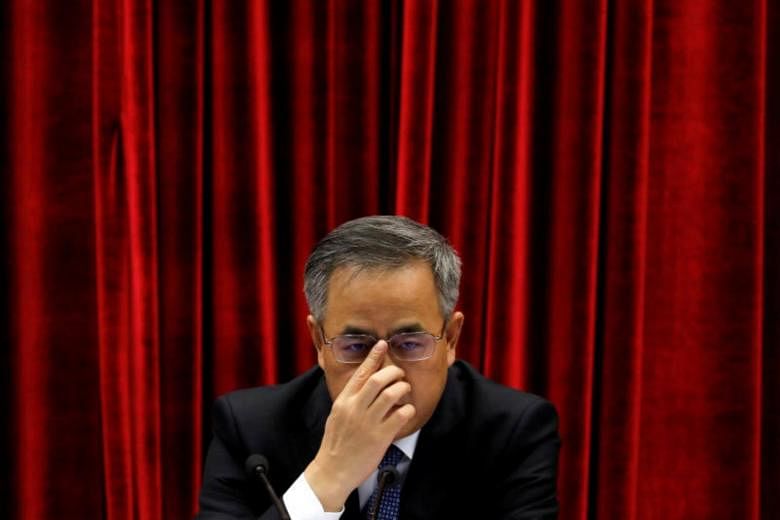GUANGZHOU (Reuters) - Hu Chunhua, the Communist Party boss of China's southern economic powerhouse of Guangdong, has long been considered a rising political star. Now, the surprise dismissal of a key regional rival may well have bolstered that image.
Sources close to top party and government officials have long touted the 54-year-old as one of the most promising of the so-called "sixth generation" of leaders born in the 1960s, someone who could be a contender to take the top job when President Xi Jinping eventually steps down.
Last weekend, another high-flier from the same generation, Sun Zhengcai, 53, was stripped of his position as party chief of the megalopolis of Chongqing and, according to two sources with ties to the leadership, has been put under investigation.
Both Hu and Sun had been widely tipped as possible newcomers to the party's most powerful body, the seven-person Politburo Standing Committee, when the party holds its once-every-five years congress this autumn.
If the publicity-shy Hu does not get on the Standing Committee, then the sources said he could be given another prominent position.
One Beijing-based Asian diplomat, citing conversations with Chinese officials, said Hu could be sent to take over the high-profile but largely ceremonial advisory body to parliament, the Chinese People's Political Consultative Conference. A second source close to the Chinese leadership says Hu may end up with a vice premier spot though not necessarily be promoted to the Standing Committee.
Hu gave no immediate response to questions from Reuters.
'DEMOCRACY VILLAGE'
Little known internationally, Hu spent most of his career in the restive region of Tibet, then became governor of northern Hebei province and later Communist Party boss in Inner Mongolia. He was catapulted in late 2012 to lead Guangdong - one of China's most important provinces that includes Shenzhen, home to many of China's best-known technology companies.
During his term, he had to deal with a fresh flare-up of protests in the so-called "democracy village" of Wukan, ordering a crackdown to show his mettle ahead of the congress .
The Guangdong Party Secretary post is one of the most prominent provincial leadership roles in China, and has served as a springboard for many politicians towards more senior national posts, including Hu's predecessor Wang Yang, who is now a vice premier.
Some who have worked with or met Hu say he has a relatively relaxed and affable leadership style. They say he has pushed hard for poverty alleviation in less developed parts of Guangdong and for innovation, helping Shenzhen build up its technology sector. Hu himself has spoken of the key tasks of upgrading and restructuring Guangdong's economy and industrial base, and of easing social conflicts and land disputes.
During his tenure, Guangdong has retained its position as China's top economic province with GDP last year of US$1.16 trillion (S$1.6 trillion), larger than Indonesia's, making up 10 per cent of China's total GDP and around 28 per cent of its overall trade.
"He's remarkable for his unremarkableness," said an Asian diplomat who declined to be named. "But his future might be on the up again."
Hu has given few clues about his deeper policy beliefs, besides an interest in China's remoter, poorer regions, stemming partly from his humble upbringing in a mountain village in central Hubei province.
"Wang (Yang) dared speak and do, to reform," said a source in Guangzhou who met Hu recently. "But Hu doesn't dare much speak. He maintains a low profile... but if you have no problems, that's sometimes enough in Chinese politics."
Hu's affiliation with the Communist Youth League faction, the power base of Hu Jintao, Xi's predecessor as president, may work against him. Xi, a "princeling" - or a privileged child of a revered revolutionary who helped found the People's Republic of China - has been trying to fill the standing committee with his allies.
POLITICAL THEATRE
For some residents in Guangdong, Hu remains an enigma after almost four years in power there.
Xu Yongdong, owner of a hole-in-the-wall diner serving beef tripe from steaming vats, was surprised to see Hu walk past his shop in January, flanked by former Chinese leader Hu Jintao in what was seen as a bit of political theatre from the two Chinese Communist Youth League heavyweights. "Hu has done fine here... but I don't hear much about him," said Xu.
This year, though, there have been signs of Hu's profile rising.
In April, Xi offered "full approval" of the Guangdong government's work since the last party congress in 2012, according to state media, in what was interpreted as an indirect endorsement of Hu.
In May, Hu pledged repeated loyalty to Xi in a speech, affirming Xi as the party's "core" leader - a designation that puts Xi on a par with other paramount leaders of the past, including Mao Zedong and Deng Xiaoping.
Hu also visited Israel, Ireland and Britain in June. Such trips are often used by senior officials to burnish their international credentials ahead of promotions.
According to state media, Hu volunteered to be sent to Tibet soon after graduating from the elite Peking University. He stayed for some two decades, learning to speak conversational Tibetan, rare for a Han Chinese official, and rose to become deputy party secretary.
While there, he met and impressed Hu Jintao, Tibet's party chief from 1988-1992, who began grooming his protege.
In Inner Mongolia, he won plaudits, sources with ties to the leadership say, for quelling protests by ethnic Mongols in 2011 against the destruction of grazing lands by mining companies.
"Hu Chunhua's credentials are the deepest of the sixth generation (aspirants)," said a source with ties to the Chinese leadership. "Unless Hu Chunhua commits serious mistakes, Xi has no reason not to let him move up."

